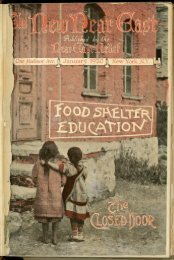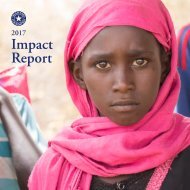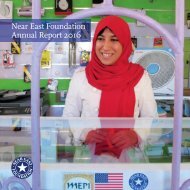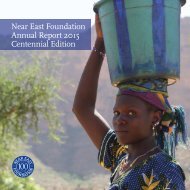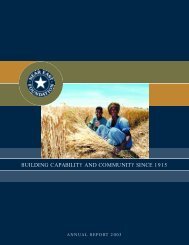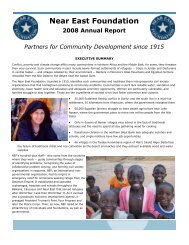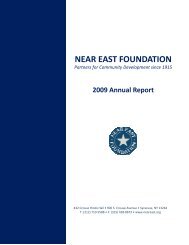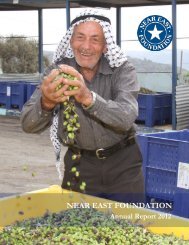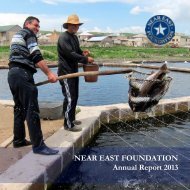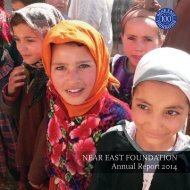2018 Impact Report
You also want an ePaper? Increase the reach of your titles
YUMPU automatically turns print PDFs into web optimized ePapers that Google loves.
2018
Impact
Report
CONTENTS
MESSAGE FROM NEF PRESIDENT
2018 IMPACTS
2018 HIGHLIGHTS
FINANCIALS
BOARD OF DIRECTORS AND COUNCIL MEMBERS
OUR SUPPORTERS
With your support, NEF is building knowledge, strengthening voices,
and creating economic opportunity for those who need it most.
THANK YOU
Photo Credit: Professor Ken Harper
Near East Foundation
2018 IMPACT REPORT
KNOWLEDGE
VOICE
ENTERPRISE
02
Presenting NEF’s 2018 Impacts and Achievements
TO OUR SUPPORTERS:
With generous support of our donors and partners, the Near East Foundation continued to lead
transformational change in the lives of the most vulnerable people in the Middle East, Africa, and Caucasus
last year. Your support has been critical to our continued commitment to improving the daily life and
futures of the people we serve, helping them to overcome conflict, instability, and inequality.
Every day, NEF’s team is on the frontlines of our world’s more pressing development challenges. They
ensure that our community-driven programs are effective, innovative, honest, and true to our core mission.
In 2018 we directly benefited 2.02 million people, including smallholder farmers coping with climate
change, women and children displaced by conflict, and aspiring young entrepreneurs.
In 2018, I was fortunate to see many of our projects first hand – from our cross-border agricultural
development work in Palestine, to our water and sanitation and women’s empowerment work in Sudan, to
our entrepreneurship programs in Jordan and Lebanon. While I was heartened to see the transformative
impact our work has on individuals and communities, I was again deeply moved by the incredible
determination and resilience of the people we serve. Every day they face challenges that many of us cannot
fathom, yet they remain hopeful about what they will make of their future. I am confident that optimism
comes from knowing they are not alone. I hope as you flip through these pages, you too are filled with a
sense of hope of what we, together, can accomplish.
It is truly an honor to do this work and to be a steward of your goodwill.
With sincere gratitude,
Charles Benjamin, NEF President
02
OUR MISSION
The Near East Foundation helps build more sustainable,
prosperous, and inclusive communities in the Middle
East, Africa, and Caucasus through education, community
organizing, and economic development.
OUR VISION
NEF’s efforts are focused on helping people and communities
move beyond survival by providing them with resources to
achieve a better future.
WE WORK WHERE THE WORLD NEEDS US MOST
Armenia Jordan Lebanon Mali Morocco
Palestine Senegal Sudan Syria Iraq Yemen
* Planned expansion
03
TOGETHER WE
Provided training and opportunities for safe and dignified
livelihoods
Implemented community-led investments to increase access
to life-sustaining natural resources
Helped some of the world’s most vulnerable rise out of poverty, regain
their confidence, and achieve self-reliance
Paved the way for people to become leaders of change in
their communities
In 2018, we directly helped
2.02 MILLION PEOPLE
04 05
This Year In:
Inclusive Economic Development
Together we helped create or expand
15,243 income generating activities
78% Women
Increased the capacity of
317 community-based organizations and women’s associations
Provided community activities for
1,625 youth to improve life skills, financial literacy, and coping strategies
Improved
8,049 people’s confidence and agency
79% Women
05
Lebanon and Jordan
After eight years of conflict, the effects of the Syrian refugee crisis continue to
take a significant toll on both Jordan and Lebanon’s most vulnerable families
and communities. With an eye toward moving people away from passive aid
and harmful coping strategies, and toward self-reliance, NEF remains committed
to helping refugees, Jordanians and Lebanese access safe and dignified
opportunities to start businesses, secure employment, access financial resources
and earn a stable income.
Ahlam, Jordan
Convenience Store Owner
“The training helped with bookkeeping
and accounting, but I
also learned I could change my
life. I found a purpose.”
To ensure its continued impact, this year NEF applied new learning to improve
the livelihoods services offered at its Siraj Centers including updating its business
development and financial literacy curriculum as well as formalizing mentorship
opportunities and advanced business coaching.
66%
Average business
survival rate
in Jordan over the last 5 years
87%
of business owners
have reported
reduced debt
Responding to feedback from female participants,
NEF established its first child-friendly safe spaces
in three of its Siraj Centers in Lebanon. Equipped with furniture, toys, activities,
and staffed by trained caretakers, NEF is proud to be pursuing a higher level of
commitment to supporting families as they work together toward a better future.
“I now am truly happy because
I am financially secure and selfreliant.”
Asma, Lebanon
Handicraft Maker
2018 also brought new partnerships and opportunities for innovation. In Lebanon,
NEF will expand its sustainable livelihoods programs to Tripoli, an urban area with
high concentrations of poverty and upwards of half-a-million refugees.
And in Jordan, NEF started implementing a revolving credit fund, accessible to
entrepreneurs who would otherwise be unable to meet the traditional lending
requirements of commercial banks. It will allow entrepreneurs with high growth
potential to access the funds needed to expand or update their business
operations.
06
Sudan
Despite the intense unrest in the country over the last year, NEF has continued to make substantial progress
helping women’s associations in Sudan develop market value chains for non-timber forest products. In
poverty-stricken areas of Kordofan, NEF is introducing women’s voices into the negotiation process, creating
market linkages, and establishing standard pricing for forest fruits grown and harvested by women. This is
increasing household income and improving product quality – including gum arabic
a major ingredient found in most soft drinks – while reducing the degradation of the
trees that produce them. The formation of local women’s associations has acted
as cooperatives for efforts around marketing, commercialization, sales, fair
price-setting, and management of these natural resources.
Haowaa, Sudan, Women’s Association Leader
07
“Before the project, our husbands never allowed us to get involved with these
activities, not even visiting the markets. Now, after seeing the results of what
we are doing through the project, we are attending project workshops and
meetings. Now there is nothing stopping us from succeeding.”
Morocco
NEF’s efforts to promote entrepreneurship and job creation among young
people in Morocco scaled up in 2018 as NEF increased engagement and
support within the greater entrepreneurship ecosystem in the Safi-Marrakech
region. Working with local partners, NEF embarked on efforts to help 260
established businesses scale-up their operations and create 100 new jobs using
targeted training, technical support, peer networks, and individual coaching –
these efforts are meeting entrepreneurs where they are and helping them rise
to their full potential. For businesses lacking funds for re-investment or access
to credit, NEF has been working to connect them
with viable financing options. Also using a
microfranchise option, NEF is improving
market access, lowering the risks
associated with business growth, and
generating additional employment
where it is severely lacking for young
people in the region.
Kaoutar, Morocco
Women’s Clothing Designer
“Each one of us has our own story,
our own thing to fight for. I think
that empowering these women [that
work for me], creating value in their
lives, and being there for them, and
myself, and my family is the path
I choose to fight for. And I just go
for it.”
26.5%
unemployment among
15-24 yr olds in Morocco
Middle East Monitor
Armenia
This year NEF put 12 community-based
“We were able to implement
organizations on the path to creating sustainable
improvements that had seemed out
funding and implementing plans for improved
of reach and gain the knowledge
necessary to build systems for
healthy organizational management.
It provided us with the platform
and capacity we needed to deliver
services and solve the problems of
our beneficiaries instead of focusing
on our own.”
organizational management.
NEF’s current efforts are strengthening the economic sustainability of Armenian
organizations that provide greatly needed social services and economic
development programs to disadvantaged women, especially those who have
been victims of gender-based violence.
Our work this year focused on helping the 12 organizations selected to establish
social enterprises to provide a sustainable source of funding for their programs in
the long term while creating new jobs for women.
Spitak Helsinki Group,
Armenia 10
08
This Year In:
Climate Resilient Development
Together we increased
1,185,995 people’s food security
51% Women
Delivered
123 community-led investments to increase resilience to climate change
Supported
149 infrastructure repairs or upgrades
Broadcasted
90 radio programs on topics including natural resource and conflict management
09
Mali and Senegal
2018 was the fourth year of the Decentralized Climate Funds (DCF) program,
which NEF leads with consortium partners IIED and IED Afrique to strengthen rural
communities’ resilience against disaster and the negative impacts of climate
extremes. NEF and its partners have worked from the local to national level to
lay the groundwork to help climate finance reach local communities – linking
the most climate-affected communities with locally controlled investment funds
while building the capacities of local governments to adopt inclusive planning
and finance mechanisms.
DCF facilitates support for community-led projects,
such as cereal banks and water basins for grain
and water storage, building wells, improving
irrigation systems, planting water efficient
crops, developing vaccination parks, and
teaching techniques for soil and water
conservation – all measures that the
communities selected to build their
resilience to climate extremes and
disasters.
“Only eight or ten percent of
international [climate] funds
reach local communities. We
wanted to change this situation
by establishing a mechanism that
puts climate funds directly from
the international level to rural
communities that are directly
impacted by climate change.”
Yacouba Deme
NEF Mali Country Director
Oumou, Mali
Women’s Association
President
“We are now able to cultivate
throughout the year thanks to
improved water availability and
securing the perimeter of our
garden. Children are better fed and
our husbands are proud of us.”
4
Local Climate Adaptation
Funds ($3.09M USD)
finance public good investments
that support community-prioritized
climate adaptation strategies
A major victory took place in December 2018 when, with NEF’s support, the
Government of Mali submitted its first application for direct access to the Green
Climate Fund. This was achieved after nearly two years of sustained support from
NEF and its partners to build capacities to access and manage the funds, and NEF
will continue to support the Government of Mali as the process continues. This is a
first for the country and will provide Mali with direct access to a fund set up by the
international community to channel billions of dollars to help poor nations tackle
climate change.
10
This Year In:
Stabilization and Peacebuilding
Together we helped
2,054 farmers and food processors recover their livelihoods post-conflict
34% Women
Supported
480 cross-border infrastructure repairs and upgrades
Launched and increased the capacity of
7 community-based livelihoods Siraj Centers in Syria
AND
8 supra-village associations in Sudan
11
Syria
Since the fall of 2017, NEF has facilitated the recovery of agricultural communities
and markets in Syria through technical training, value chain analysis, input
grants, and access to equipment and supplies. By increasing access to sales
channels and improving the quality and value of the goods being produced,
NEF is improving the livelihoods, food security, and economic resilience of
conflict-affected farmers and food processors. NEF is also helping to rebuild and
strengthen essential agricultural value chains to accelerate economic recovery
and reduce reliance on food aid as the country stabilizes. In the past year, NEF
established seven Siraj Centers among some of the most
vulnerable populations in Syria to deliver these
services.
Chief of Party, Syria
“The local councils we’re reaching
are excited and very supportive of
the work and the progress made
so far. We look forward to seeing
the impact these efforts will have
on not only the individual farmers,
processors, and their families,
but also on the agricultural sector
within these communities.”
13.1
million
people in Syria are in
need of food, aid, and
livelihood assistance
UNHCR
Eissa, Sudan
Village Chief
“This helped the village leaders
by raising awareness of the
importance of conserving our
natural resources, especially
the forests. It has decreased the
amount of conflict between
pastoralists and farmers in the
area.”
Sudan
NEF continued to establish Supra-
Village Associations, or SVA’s, in Central
Darfur State. Made up of representatives
from multiple villages and social groups, SVA’s
facilitate the peaceful sharing of natural resources
among ethnically diverse communities. Partnering with other local organizations,
NEF provided Trainer of Trainers programs to members of subcommittees that
are dedicated to conflict resolution, agriculture, forestry, animal health, pest
management, and income-generating activities. Using this approach, NEF
saw significant improvements in community organization and leadership,
and increased representation for women and youth. SVA-led demarcation
of livestock corridors and agricultural extension has largely contributed to
environmental protection and income generation, creating tangible benefits
for many communities.
12
This Year In:
Water and Sanitation
Together we gave
596,271 people access to safe water
AND
decreased sickness and time consuming, dangerous travel to water points
Completed
6,708 infrastructure repairs and upgrades such as hand pumps, wells, and latrines
Distributed
3,097 hygiene and sanitation kits
and established or assisted
69 water and sanitation committees
13
Sudan
This year, NEF’s teams in South Kordofan and Central Darfur reduced the risk of
morbidity and mortality of nearly 100,000 people by improving their access to
clean water and education on hygiene and sanitation best practices. Working
within local communities, NEF mobilized Water and Sanitation Committees
(WSCs). WSCs are trained on the best approaches for improving sanitation and
hygiene, and on how to identify and prioritize infrastructure improvements –
from water pumps to latrines. NEF helped to train and employ local craftspeople
and artisans to manufacture and rehabilitate water pumps and latrines in 65
villages. NEF’s work to increase the technical and management capacity of
local organizations to promote and facilitate good water, sanitation and
hygiene (WASH) practices also contributed to the
increase in access to safe water and improved the
coordination of local needs overall.
Izzaldin, Sudan
WSC Leader in Dambar
“Our community suffers from
many diseases due to the lack of
safe drinking water. The WSC
was formed to address this,
and we have already started to
implement WASH practices to
address and solve these issues in
our area.”
32%
of Sudan’s population is
drinking contaminated
water from unimproved
water sources
reliefweb
Palestine
Mohammad, Palestine
Cucumber Farmer
“I will be able to reduce water
usage, fertilizers, and the number
of workers needed. I will also be
able to irrigate my farm any time
during the day or night.”
Restricted access to land, water,
agricultural inputs, and markets has
harmed the agricultural sector and the
welfare of Palestinian farmers. Cut off from
new agricultural technologies, Palestinian farmers rely heavily on traditional
practices, making it difficult to increase their income. To address this gap,
NEF pursued improvements in productivity and market access through the
adoption of improved technologies. Through a partnership with Netafim,
a global irrigation manufacturer, and the Middle East Investment Initiative,
NEF helped install 34 high tech irrigation systems benefiting 39 farmers and
covering 120 hectares. Based on initial reports from cucumber farmers, the
use of the new irrigation systems has resulted in a 30 to 40 percent reduction in
water and pesticide use, reduced incidence of diseases, and reduced labor.
14
Financials
NEF works to provide the highest levels of tranparency and efficiency. See our complete FY2018 consolidated
financial report at www.neareast.org/download/financial_statements
REVENUE
2018 FUNDING SOURCES
2018 $16,537,456
2017 $15,201,317
2016 $11,199,005
89% Governments
5% Foundations
5% Individuals
1% Corporate
EXPENSES
2018 EFFICIENCY
2018 $16,473,244
2017 $15,020,213
2016 $10,163,713
94% Program Services 5% Management/General
1% Fundraising
NET ASSETS
BEGINNING $6,104,714 ENDING $6,168,926
15
19
Programs
NEF continuously strives to achieve excellence in operations and organizational management. We are focused
on increasing programmatic innovation, implementation, and learning in order to increase our impact.
PEOPLE SERVED
CORE PROGRAM AREAS
2018 2,020,000
2017 1,600,000
2016 558,000
32%
32%
20%
Livelihoods Development
Natural Resource Mgmt
WASH
13%
3%
Peacebuilding
Education
LOOKING AHEAD
Expanding operations to Iraq in 2019
and Yemen by 2020
PROJECT DISTRIBUTION
31 active projects in 9 countries
Iraq
Yemen
8
6
4
Sudan
Palestine
Mali
3 Morocco
3 Jordan
2 Lebanon
2 Senegal
2 Syria
1 Armenia
EMPLOYEES
276 WORLDWIDE
99%
OF STAFF ARE FROM THE
COUNTRY WHERE THEY
WORK
274
INDIVIDUAL
DONORS
20
16
• COMMUNITY-DRIVEN
• I N C L U S I V E
• S U S T A I N A B L E
• C O N F L I C T - S E N S I T I V E
• E T H I C A L
DONATE TODAY. WWW.NEAREAST.ORG
A Trusted Vehicle for your Philanthropy
for over 100 Years
COST EFFECTIVE PROGRAMS
NEF delivers high impact programs while keeping our overhead costs
low, making the most of your donation.
CHARITY NAVIGATOR
NEF’s commitment to accountability and
transparency has earned it a 4-star rating
from Charity Navigator, America’s largest
independent charity evaluator.
GLOBAL GIVING
In 2018, NEF was recognized as a vetted
member of the GlobalGiving community
for being a trusted partner and changemaker
in the world.
BETTER BUSINESS BUREAU
NEF is an accredited member of the Better
Business Bureau meeting the highest
standards for ethics and accountability to
ensure confident charitable giving.
ENDING POVERTY STARTS WITH AN OPPORTUNITY.
17
NEF Board of Directors
U.S. BOARD OF DIRECTORS
Haig Mardikian, Chairman
Robert J. Solomon, Chairman Emeritus
Johnson Garrett, Vice Chairman
Charles Bird, Treasurer
Charles Benjamin, Ph.D., President
Carol B. Aslanian
Nina Bogosian Quigley
Mehrzad Boroujerdi, Ph.D.
Randa El-Sayed Haffar
Mona Eraiba
Rana Gillmon
Jeff Habib
Linda K. Jacobs, Ph.D.
Osamah Khalil
Shant Mardirossian
William Sullivan
U.K. BOARD OF DIRECTORS
Anthony R. Williams, Chairman
Robert Brown, Ph.D.
Johnson Garrett
Linda K. Jacobs, Ph.D.
Linda Layne, Ph.D.
Anthony G. Williams
BELGIUM BOARD OF DIRECTORS
Linda K. Jacobs, Ph.D., Chair
Robert Brown, Ph.D.
Anthony R. Williams
Johnson Garrett
Amr Nosseir
ACADEMIC COUNCIL
John Kerr, Ph.D.
John McPeak, Ph.D.
Thomas Mullins
Juliet Sorensen, J.D.
Michaela Walsh
HONORARY BOARD
Shahnaz Batmanghelidj
Amir Farman-Farma
John Goelet
John Grammer
Ronald Miller
Anthony Williams
Tarek Younes
PRESIDENT’S COUNCIL
H.E. Andre Azoulay
Ian Bremmer
Ambassador Edward P. Djerejian
Vartan Gregorian, Ph.D.
Ambassador Richard W. Murphy
Her Majesty Queen Noor of Jordan
James B. Steinberg
Ambassador Frank G. Wisner
20
18
Institutional Funders
Armenian General Benevolent Union
Asfari Foundation
Big Lottery Fund
Bogosian Quigley Foundation
CARE Maroc
City and Guilds Group
Cleveland H. Dodge Foundation
Comic Relief UK
Elmer & Mamdouha Bobst Foundation
Elsa and Peter Soderberg Foundation
Partners
Al-Farooq Charitable Society for Orphans
al Hadatha Association Foundation
alAmana Microfinance
Arcenciel
AMAPPE
Association d’Appui de Developpment Integre
Ein Al-Bida Female Youth Center
Galilee International Management Institute
Gegharkunik Chamber of Commerce/Industry
Halima Association for Women
Hand in Hand for Development and Peace, Sudan
European Union
Global Giving
Government of the Netherlands
International Organization for Migration
U.K. Department of International
Development
UN Population Fund
U.S. Agency for International
Development (USAID)
USAID Office of Food for Peace
Innovations Environnement Développement Afrique
International Institute for Environment and
Development
Jordanian Ministry for Youth
Jordanian National Forum for Women
Maison des Associations (Safi)
Majales El Kheir for Peace and Development
Marrakech Generations
Middle East Investment Initiative
Netafim
Org. for Voluntary Humanitarian Assistance Program
USAID Office of Foreign Disaster
Assistance
U.S. Department of State Bureau of
Population, Refugees, and Migration
U.S. Middle East Partnership Initiative
Vitol Foundation
World Food Programme
World Bank
Palestinian Center for Agriculture Research and Dev.
Peres Center for Peace
Qawafel Al Khair
Réseau Marocain de l’Economie Sociale et Solidaire
Sahab Society for Social Development
Sudanese Organization for Humanitarian Aid
Sudanese Red Crescent Society
Syracuse University
Women’s Development Resource Centre Foundation
Working Women Society
Youth Society for Self-Development
Thank you to the community of generous donors that allow NEF to
create positive change for families and communities in need.
We are grateful for each and every donation received, and hope that you will continue to support NEF
long into the future.
To see the complete list of donors for the July 1, 2017–June 30, 2018 fiscal year, please go to:
www.neareast.org/2018-impact-report
19
21
Remembering Chuck Robarts
In 2018, NEF said goodbye to Richard Robarts,
a revered leader of the Near East Foundation for
nearly 22 years (1982-2003), whose philosophies and
impacts are still very much present at NEF today.
NEF is forever grateful for Chuck’s contributions
and the countless lives that he touched. For his
dedicated service to the organization and to
changing the lives of those in need, NEF dedicates
the 2018 Impact Report to his memory.
Richard Charles (Chuck) Robarts
(1932 - 2018)
A special thank you to Syracuse University for enabling NEF to draw upon
the talent and creative energy of the academic community to help address
critical challenges while training a new generation of leaders who will guide
the future of social and economic development worldwide.
@NearEastFdn
Near East Foundation
@neareastfoundation
NY OFFICE
110 West Fayette Street, Suite 710
Syracuse, NY 13202
United States
UK OFFICE
7-14 Great Dover St.
London SE1 4YR
United Kingdom
BELGIUM OFFICE
Drève du Pressoir, 38
Brussels-Forest, 1190
Belgium
DC OFFICE
1875 K St. NW
Washington, DC. 20006
United States
CONTACT
info@neareast.org
www.neareast.org
20
www.neareast.org







